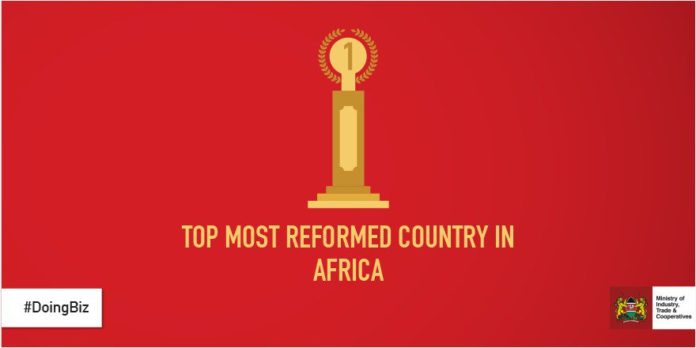
….as Government attributes growth to string of institutional and policy reforms
Nairobi, Wednesday, October 26, 2016: Kenya has clawed its way back into the global stage by making it to the double digit rankings of the world’s most conducive business environments, Africa’s most reformed country and for the second consecutive year, the world’s 3rd most reformed country.
World Bank’s Doing Business 2017 Report released today, Kenya has climbed 21 places to 92nd from 113th last year (with the World Bank having revised last year’s position from 108th). Kenya has with this result attained a record 44 places jump in two years to return to clinch Africa’s top reformer slot and break into the double digit zone for the first time since 2009.
The report indicates that Kenya has implemented regulatory reforms in 5 indicators aimed at making it easier for local entrepreneurs to do business in the country in 2016/17, amongst the highest reforms by any country.
Each year, the World Bank Group and International Finance Corporation benchmarks 190 countries globally against 10 indicators on how easy it is to do business in the country.
A high ranking on the ease of doing business index means the regulatory environment is more conducive to start and operate a local firm.
Speaking in Nairobi, during the Doing Business 2017 release, Cabinet Secretary, Adan Mohamed described Kenya’s consecutive improvement as a vindication of successful pro-business reforms in pursuit of the national development agenda.
“The improvements we have made this year are as a result of the hard word over the past two-years when we instituted alongside the our World Bank partners and private sector to improve the efficiency of government operations through regulation and legal reforms meant to improve the reality of business operations on the ground,” said Mohamed
Crediting the reforms across the regulatory and legal indicators, the CS said the country is already halfway to achieving its target to be among the most reformed.
“Despite the consecutive improvements, we will continue working on closing the gap in many key areas that impact the ease of doing business in our Country, especially on areas with the lowest scores. It is a long arduous path filled with challenges to attain our goal to be among the top 50 most reformed globally by 2020,” reiterated Mohamed
Much as the Kenya’s gains were associated with efficiency-related measures such as fewer procedures, shorter time periods and lower costs, the quality of regulations, influenced Kenya’s upward score of 61.22 in Doing Business 2017 from 57.50 in Doing Business 2016.
Cabinet Secretary Adan Mohamed said Kenya instituted 5 reforms in the areas of Starting a Business, Getting Electricity, and Registering Property, Protecting Minority Investors and Resolving Insolvency.
On Starting a Business indicator, Kenya improved upwards, a reform trend the World Bank Group credits to 3 effected reforms.
“Kenya made starting a business easier by removing stamp duty fees required for the nominal capital, memorandum and articles of association. Kenya also eliminated requirements to sign compliance declarations before a commissioner of oaths,” indicated Mohamed.
Getting Electricity was also a big winner following Kenya’s connectivity initiative aimed to enhance access to electricity.
“Kenya streamlined the process of obtaining a new electricity connection by introducing the use of a Geographic Information System which eliminates the need to conduct a site visit, thereby reducing the time and interactions needed to obtain an electricity connection,” said Mohamed.
Last year, Kenya’s electricity connection procedures were reduced to 3 from 6 appropriately reducing the number of days it takes to get electricity connection to businesses from 158 to 110 days.
On Registering Property, Kenya carried on with last year’s reforms to digitize its land records, making registering property easier by increasing the transparency at its land registry and cadaster.
“We expect this re-organisation of land processes to continue reducing the number of procedures, customer interactions points whilst spurring efficient service delivery,” said the Cabinet Secretary.
The report showed marginal increase in scores on Protecting Minority and Resolving Insolvency respectively following legal and policy reforms.
On protecting minority investors, Kenya was credited with strengthening “clarification of ownership and control structures, by introducing greater requirements for disclosure of related-party transactions to the board of directors, making it easier to sue directors in cases of prejudicial related-party transactions and by allowing the rescission of related-party transactions that are shown to harm the company.”
On Resolving Insolvency, the report indicates that Kenya made resolving insolvency easier by “introducing a reorganization procedure, facilitating continuation of the debtor’s business during insolvency proceedings and by introducing regulations for insolvency practitioners.”
According to the Mohamed, this was enabled through the enactment of the Companies Act and Insolvency Act 2015 which was aimed at revolutionising business needs of modern Kenyan businesses.
According to the private sector, the results are a harbinger of change and testimonial that Government is keen to create an investor conducive environment for the private sector.
On a continental scale, the report notes that Sub-Saharan Africa had implemented a record of 80 reforms in 37 of the region’s 48 countries over the past year, 14% more than the number of reforms recorded last year (69) leading in the world’s number of reforms.
















